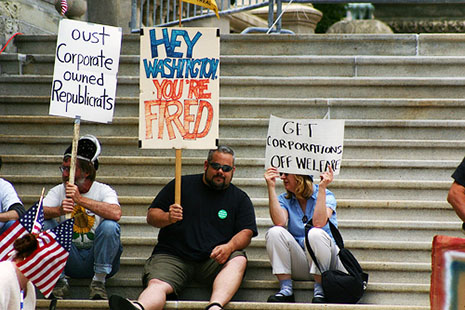IN 1952 America’s most famous newspaper columnist, Walter Lippmann, backed the Republican presidential candidate, Dwight Eisenhower. Many other Americans felt the same way, but one of Lippmann’s reasons for supporting Eisenhower was unusual. He worried that if the Republicans lost their sixth presidential election in a row then the party would fall into the hands of its “most irreconcilable and ruthless factions.” After twenty years of Democratic Party dominance, dating back to Franklin Roosevelt’s New Deal, the Republicans’ charges against the government had become increasingly reckless, most infamously with Senator Joseph McCarthy’s witch-hunts against communist infiltration. In Lippmann’s view it was the Republicans’ lack of power that had made them so irresponsible.
How does the Lippmann thesis hold up in 2010? Two years ago, when they lost the presidency, the Republicans had been in the White House for twenty-eight of the previous forty years. They had often enjoyed congressional majorities and had nominated a majority of Supreme Court justices. Their appointees filled the upper echelons of government, and lobbyists and interest groups aligned with the party dominated the flow of political money. Yet their base and its rhetoric were fired by the fight against “Washington.” Their annual convention only became electrified when the “insurgent” Sarah Palin was nominated as the party’s candidate for vice-president. Yet, although the Republicans seemed to have quickly become the party of perpetual estrangement, they were still relatively good-humoured.
Two years into the Obama presidency, the mood is decidedly uglier. The calls from the Tea Party for today’s “American patriots” to “take back” their country have captured support among conservative Republicans, giving a new edge to the battle between the two major parties. For some “patriots” the task of winning back support from the Democrats is made more urgent by their beliefs about the president. Barack Obama is a practising Christian, born in Hawaii, with an American mother and a Kenyan father, but recent polls indicate that around a quarter of Americans believe he is a Muslim and roughly the same number either do not believe or doubt that he was born in the United States. (If he were born outside, he would be ineligible to be president.) Palin endorses their doubts: “the public rightfully is still making it an issue,” she said recently, adding that “members of the electorate still want answers.” Another Republican presidential hopeful, Newt Gingrich, says that Obama has a “Kenyan, anti-colonial” worldview.
The Tea Party and its Republican supporters rejoice in militant rhetoric. When the Republicans were criticised for simply opposing everything, Palin proclaimed that the party isn’t the party of no, “We’re the party of hell no!” After Obama’s healthcare package was passed, she tweeted to her followers: “Commonsense conservatives and lovers of America: ‘Don’t retreat, instead – RELOAD.’” Her website featured pictures of the Democratic representatives who supported health reform in the crosshairs of rifle sights, although of course she was only targeting them metaphorically.
Walter Lippmann might be somewhat shocked by this “irreconcilable and ruthless” rhetoric but he would be totally unprepared for the new phenomenon of Rupert Murdoch’s Fox News and its abandonment of traditional journalistic standards and constraints. The most obvious feature of Fox is its partisan bias, expressed in constant vilification of Democrats. But equally important is the way it has become a force within Republican politics, making the task of moderates in the party much more difficult.
Fox now has on its payroll four of the five leading potential Republican contenders for the 2012 presidential nomination. When an editor from another network wanted to interview Palin, he was told he would first have to get Fox’s permission. Fox’s newest star is Glenn Beck, who made his own news by staging the “Restoring Honor” rally in Washington attracting 90,000 people. In his first eighteen months on Fox, Beck and his guests invoked Hitler 147 times, Nazis 202 times and fascists 193 times – usually in reference to Obama. He once claimed that the president has a “deep-seated hatred for white people or the white culture” and proclaims, “To the day I die I am going to be a progressive-hunter.”
The unholy alliance between ruthless and irreconcilable elements of the Republican Party and a mainstream broadcaster-turned-propaganda-outlet may or may not have electoral consequences. One plausible guess by former Bush speechwriter and Republican moderate David Frum is that it will help them in the midterm congressional elections, where turnout is lower, by mobilising the base, but make it harder to win the 2012 presidential election by taking them further from the mainstream.
Two other effects are even more important for the quality of American democracy. One is the way the alliance increases polarisation and raises the levels of intolerance. Charges of bad faith overwhelm policy debate. Borrowing the words of Yeats’s poem, it raises the risk that the centre cannot hold.
The other is captured in the title of one of Lippmann’s books, Drift and Mastery. One of the ideals of democracy is that there will be collective decision-making about the problems we face in common. American society faces many great and complex challenges, but while lovers of America “reload” and Obama is compared with Hitler there will continue to be drift rather than realistic debate about what policy options might build a better national, let alone global, future. •




